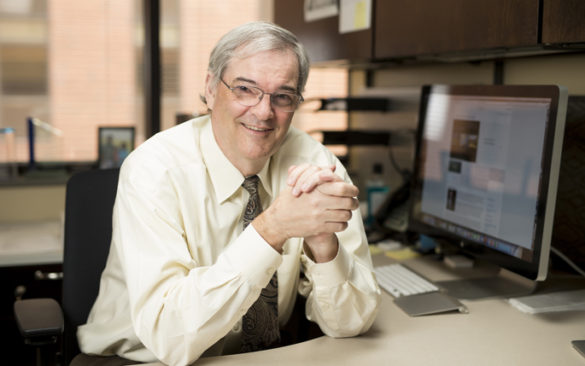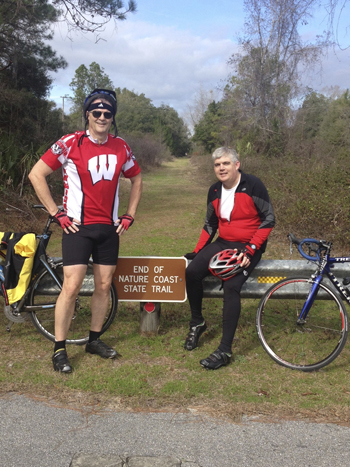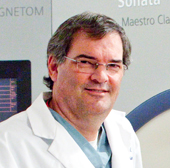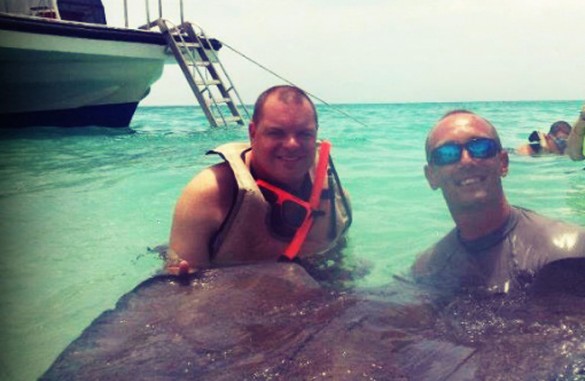
Ten years ago Mark Rice, M.D.’s beloved Green Bay Packers were playing football against the Miami Dolphins, and he was in the stands with his parents and children. It was a hot day. A woman nearby went into a seizure, and Rice went to her aid.
“Her boyfriend was trying to get this lady to break her seizure by pouring water in her mouth, if you can believe it,” he said.
Over the preceding years, Rice had become an entrepreneur and inventor, a path that had required abandoning the practice of anesthesiology. His career as a physician was in mothballs, his résumé something of a collage.
“I went down there and took care of her and started an IV. And I thought, I miss this. That was sort of the start of thinking about doing this again.”
At 50, for an abbreviated period, Rice became an anesthesiology resident once again, and within six months he accepted a faculty position at the University of Florida. A year later, in 2008, he became chief of transplantation anesthesiology at Florida. He came to Vanderbilt in 2015.
Three years ago, another turning point of sorts came for Rice, after his left shoulder was injured in a bad skiing accident in Aspen, Colorado. He says undergoing reconstructive surgery changed how he approaches work as a clinician and teacher.
“After I had my shoulder surgery, I really thought about it. My close friend put me to sleep, and one of my good friends was the orthopaedic surgeon. Thinking about that, I began to see what I do completely differently. I’d always seen it going to work as a doctor, and after that I saw it going to work as a patient. It sounds hokey but it’s actually true. It changed my motivation, how I view all the little details that are needed to do things right, and the importance of treating people as people. I believe I think about it every day I’m here at work.
“I tell the residents the same thing — that could be you, or that could be your brother or mother sitting there.”

Besides work as an anesthesiologist and clinical administrator, Rice holds a handful of patents, has authored numerous studies (including many that concern clinical measurement of blood glucose), has been successful as an entrepreneur, has led a private group practice, is proud of having won graduate teaching awards at three different universities, and is an especially well traveled visiting professor who’s spoken at several of the leading medical institutions in the U.S. and Europe.
There’s a simple explanation for his rather rambling CV.
“I have a short attention span, that’s the truth. It drives my wife crazy.”
Rice’s wife is Lori Deitte, M.D., professor and vice chair of Education in the Department of Radiology and Radiological Sciences at Vanderbilt.
Rice is professor and vice chair of Clinical Affairs in the Department of Anesthesiology and chief of the Division of Multispecialty Adult Anesthesiology.
Rice oversees the clinical work of some 120 anesthesiologists, conducted in operating rooms at Vanderbilt University Adult Hospital and Monroe Carell Jr. Children’s Hospital at Vanderbilt, as well as at pain and preoperative clinics on and off campus. Along with patient focus and attention to detail, he views team communication as vital for success in the OR.
“This place runs very well, but the few times we see problems it’s got to do with communication — you wanted to do something and you didn’t talk to the surgeon, he or she didn’t understand, the nurse didn’t know you needed that. If people communicated better, almost all that would go away. It’s rarely technical problems, it’s rarely knowledge problems. You learn to play in the sandbox when you’re in kindergarten and if everybody learned a little bit better we’d all be better off.”
Rice estimates that 40 percent of his work is devoted to his own clinical practice in the operating room, with patients undergoing general surgery, liver surgery, vascular procedures, trauma surgery, ear-nose-throat procedures. In his work as a clinician, “I think for me the biggest principle is taking care of patients like I would want to be taken care of, attending to all the little details and doing what I’d want for myself, for my family.”
The couple’s youngest son graduated from Vanderbilt two years ago and works in commercial data analytics, another son works in the sports business office at the University of Wisconsin, and their daughter (who met her husband where Rice and Deitte met, in second semester college calculus) is a health care information technology consultant.
Rice describes his hometown of Marshfield, Wisconsin, as “‘Leave It to Beaver’ times 5,000.” His parents were small-business owners, and growing up he worked in his father’s pharmacy.
Rice studied chemistry and math at the University of Wisconsin-Eau Claire. During college he worked construction for a couple of summers, and worked in a chemistry lab at the school. He began medical school at Medical College of Wisconsin but transferred to Madison once Deitte had enrolled there. Deitte is also from Wisconsin.
As he emerged from his medical training, Rice began flying airplanes, and would eventually own a series of planes. (He chose to attain a commercial pilot’s license rather than just a private one, “because I wanted to be really good at it.”)
He gave up owning and regularly flying airplanes when work as an entrepreneur began to monopolize his time. In the ‘90s, he and one of his brothers founded a pharmaceutical distribution company. He eventually bought out his brother’s stake and later sold the company to a conglomerate.
In another long-term venture, Rice ushered through development and built a fledgling company around his idea for a new way to measure blood glucose. The method involved measuring activity in the retina, specifically the return to color vision after exposure to bright light; it turns out that the greater the level of blood glucose, the slower the return to color vision. Patient safety considerations ultimately sank the project when the device proved inaccurate outside of darkened conditions.
About 10 years ago, after tearing a calf muscle while training for a half-marathon, Rice took up cycling, and says he’s never gone running again. He typically rides 50 to 80 miles per week on his carbon-fiber road bike. This spring he travelled to Utah for five days of biking in the mountains with friends.
No matter the venture, Rice gives it his all, a trait he learned growing up in Wisconsin.
“I grew up in a town where there were many physicians, and they all seemed to be doing it for the right reasons,” Rice said.
“They weren’t driving in fancy cars, they didn’t live in big houses — all the things you see in the movies about physicians, none of that was true where I grew up. These were salt-of-the-earth-type people who lived just like everybody else, really nice people who genuinely believed in what they were doing. And that had a big effect on me.”















